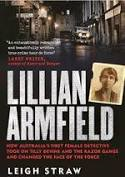Lillian Armfield: How Australia’s First Female Detective Took on Tilly Devine and the Razor Gangs and Changed the Face of the Force (Hachette Australia Books 2018) is a non-fiction account by Leigh Straw of the fascinating tale of the life and work of Lillian Armfield. A descendant of a convict on the First Fleet, Lillian was born in 1884 as one of eight children (not all of whom survived to adulthood), and was by all accounts an imposing, physically tall and statuesque woman, with a steely determination, a mind of her own, a drive to succeed in her chosen profession, and a compassion for those she worked with, both the victims and even the criminals. Lillian never married or had children. Initially she worked a tough job in an asylum, but then when the police advertised for two Women Officers to join the NSW Police Force, she jumped at the opportunity to apply. At that time, they were issued no uniform or weapon, and did not have the power to arrest people. But Lillian quickly made herself indispensable, first searching for and caring for runaway girls, trying to help them avoid ‘getting into trouble’ or in with the wrong crowd. She made a name for herself going undercover to reveal fake fortune-tellers who were defrauding innocent people of their money, and she was firm but fair with the prostitutes she came to know well, and who came to respect her for her fairness and her compassion, names such as Tilly Devine and Kate Leigh, Nellie Cameron, ‘Pretty Dulcie’ Mary Markham and the notorious cocaine dealer ‘Botany May’ Smith. The Razor Gang Wars tested her resolve, as did numerous infamous cases such as the mysterious Pyjama Girl murder.
Anyone interested in true crime will appreciate the depth of research Leigh Straw has devoted to this book. She has unearthed a treasure trove of facts about the history of Sydney’s underworld and organised crime and takes the reader from the 1920’s through decade by decade of crimes from drug-trafficking, opium dens and sly-grog shops, to rape and murder. And for those interested in feminism, Lillian Armfield was an example of an early feminist who entered a man’s world with enthusiasm and diplomacy, determined to help those less fortunate and to catch and bring to trial those guilty of crimes, and particularly those who were morally corrupting others. The book is quite research-heavy, but this is balanced by the many anecdotal stories Leigh Straw has included about Lillian’s personal life and family, and the changing face of the police force over the years. The book is meticulously acknowledged through the bibliography and extensive notes and provides plenty of other suggested reading for those keen. It also includes photographs of early police working conditions, mug shots and a fascinating article published about Armfield in 1938.
And the author reveals a very interesting twist in the Afterword, when she sheds light on a mysterious photograph of Lillian and hints at what might have been a very well-kept secret despite Armfield’s respected position.

